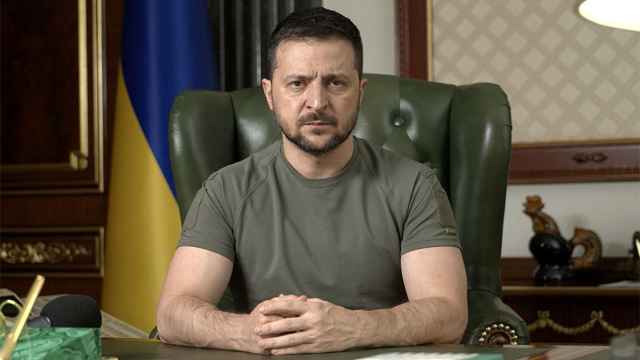A recent media industry conference offered a glimpse of what lies ahead for a modernized Russia — complete with worms and bad language. Every session of the Russian Internet Week, held by the Russian Association of Electronic Communications in late October, was broadcast online. Comments regarding each speech immediately appeared on Twitter, and I suspect that even the speakers themselves cleverly managed to talk and tweet at the same time.
At a roundtable discussion on the Internet and democracy, a dispute broke out as to whether Tver Governor Dmitry Zelenin was out of line when he posted a photo on his blog of a worm he said he found in a salad at a Kremlin dinner. During the ensuing argument, Alexei Chadayev — who was billed as “director of ideology for United Russia” — used expletives several times. The facilitator of the online-offline discussion concluded that the expletives drew the most comments from participants and observers of the forum. For me, that worm and the expletives have become veritable symbols of democracy and the Internet in Russia.
The patron saint of the Russian Internet is, of course, President Dmitry Medvedev. Not only is he an active blogger, but he encourages other officials to blog as well.
As for Russian television, Prime Minister Vladimir Putin is undeniably the patron saint of prime time. On the TV screen, he comes off looking even more competent and self-assured than the president, who is nominally his boss. In fact, television is to the media what the oil industry is to the economy: In good times and bad, the lion’s share of advertising revenue consistently goes to TV.
At another industry conference, the congress of the National Association of Broadcasters held last week, it emerged that broadcasters are worried. Terrestrial television is slated to switch to digital broadcasting by 2015, but there are not enough frequencies in the new format to meet demand. Exactly who gets what so far has been decided by the president and prime minister. In other words, the process resembles the privatization of the 1990s. But at the same time, the rapid pace of developments in satellite and cable networks, along with broadband Internet access, could soon make broadcasting programs over the airwaves as archaic as selling crude oil instead of electricity.
Unfortunately, the political Mount Olympus lacks a deity who champions the interests of the print media. At the recent annual Publishing Expo sponsored by the Guild of Press Publishers, the modern colleagues of Johannes Gutenberg gathered in a cozy corner of old Moscow at one of the country’s newest convention centers. The event began as such forums do all over the world now — with publishers so vehemently denying rumors of the imminent demise of newspapers and magazines that they almost seemed to believe the negative predictions themselves. But they calmed down considerably during discussions about the outstanding opportunities the Internet and iPad offer for disseminating their content. What’s more, the print media are moving boldly into the future: Newspapers and magazines already exude the aroma of coffees and perfumes to the enjoyment of both readers and advertisers. Tomorrow, they might tell jokes with a human voice or even respond to readers’ thoughts to engage their audience in a truly interactive experience. The publishers left the expo with high hopes for the future.
For my part, all those heady predictions of electronic utopias left me wanting to spend the rest of my life relaxing on my couch with a pleasant, old-fashioned book in my hands.
Alexei Pankin is editor of WAN-IFRA-GIPP Magazine for publishing business professionals.
A Message from The Moscow Times:
Dear readers,
We are facing unprecedented challenges. Russia's Prosecutor General's Office has designated The Moscow Times as an "undesirable" organization, criminalizing our work and putting our staff at risk of prosecution. This follows our earlier unjust labeling as a "foreign agent."
These actions are direct attempts to silence independent journalism in Russia. The authorities claim our work "discredits the decisions of the Russian leadership." We see things differently: we strive to provide accurate, unbiased reporting on Russia.
We, the journalists of The Moscow Times, refuse to be silenced. But to continue our work, we need your help.
Your support, no matter how small, makes a world of difference. If you can, please support us monthly starting from just $2. It's quick to set up, and every contribution makes a significant impact.
By supporting The Moscow Times, you're defending open, independent journalism in the face of repression. Thank you for standing with us.
Remind me later.





